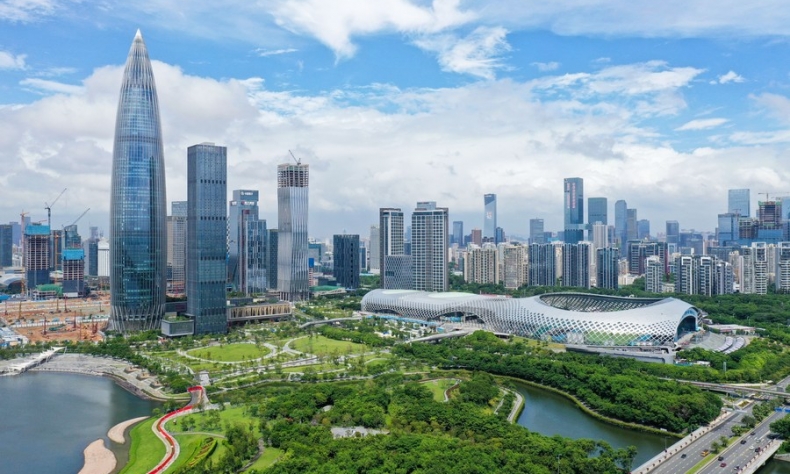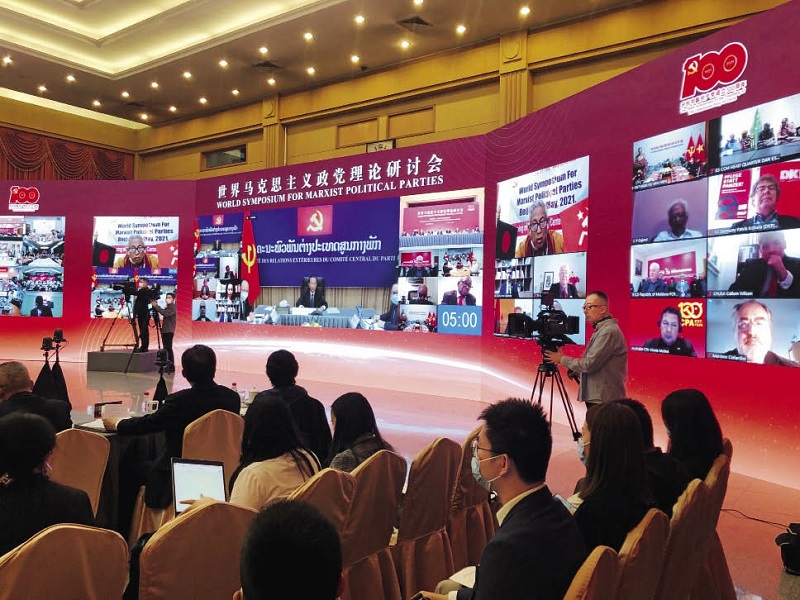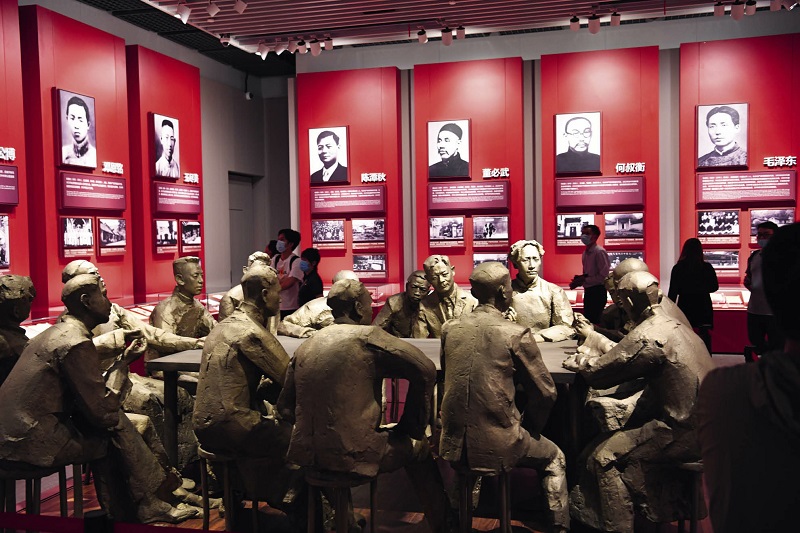China Enlightening the World with Its Unique Development Path

The community with a shared future for mankind should feature fairness and justice, and play a role in advancing peaceful settlement of international disputes and maintaining stability of the international order.
“Each time I visit China I can spot fresh changes: new buildings, new roads, and new facilities. China’s incredible economic achievements set an excellent example for other countries.” So remarked Bassam al-Salhi, secretary general of the Palestinian People’s Party (PPP) on May 27, in a video link with reporters, shared with leaders of Marxist political parties in Sri Lanka and Italy, ahead of the World Symposium for Marxist Political Parties hosted by the International Department of the CPC Central Committee.
“Certain people are skeptical about the socialist development path, and cast doubt on the future of socialism. I think China’s development stands as the best rebuttal of such misgivings,” Bassam said. In contrast to the development pattern of developed Western countries, characterized by domination of the global economy and resources, “… while advancing the joint construction of the Belt and Road, China also provides countries along the routes with opportunities to develop. China’s economic success has accentuated its new development concepts unprecedented in human history, which has captured global attention,” Bassam said. He also expressed hope that foreign translations of books encapsulating key concepts and thoughts on China’s governance and development, from which other countries could learn, would be forthcoming.
In the days leading up to the centenary of the Communist Party of China (CPC), discussions on China’s development road and key concepts of domestic and global governance waxed. The pedantry and multiplicity of half-baked censures from the West notwithstanding, since 2012 China has lifted around 100 million rural residents out of poverty; the country has also achieved rapid and effective control of the COVID-19 pandemic within its borders. Such indisputable facts have drawn ever-greater global attention to China’s development pattern and governance, and to the logic of its guiding theories. China’s new proposals and initiatives in regard to global governance and development, meanwhile, continue to gain growing endorsements worldwide.

Innovative socialism concepts guiding China’s development
“Today, the correctness of the road China has taken is clear by virtue of its having become a global economic powerhouse,” general secretary of the Communist Party of Sri Lanka Geeganage Weerasinghe said. He further observed that China’s economic practices, its poverty alleviation drive in particular, are a source of inspiration to political parties the world over. Weerasinghe ascribed China’s economic feats to the CPC’s innovative development concepts, which signify the evolution of Marxism in China. Guided by innovative theory, the CPC, under the leadership of General Secretary Xi Jinping, excels at long term planning, something his party should study and learn from, Weerasinghe observed.
PPP Secretary General Bassam al-Salhi remarked that China’s innovation is embodied also in its measures to promote development. “As in many other countries, China’s development is uneven. To narrow gaps, the central government has introduced the pairing of developed and lesser developed regions — a highly creative measure,” Bassam said.
National Secretary of Italian Communist Party Mauro Alboresi observed that it is the CPC’s innovative development of Marxism by adapting it to China’s context that has enabled the country to blaze a road of socialism with Chinese characteristics. He moreover held that the capacity to keep pace with the times and adapt its policies to changing situations is an important reason why the CPC has achieved such phenomenal development. “I think socialism with Chinese characteristics, having absorbed the essence of traditional Chinese culture, constitutes Marxism’s advancement. This is why China’s development path has proven so successful. We can learn much from the CPC’s century-long evolvement,” Alboresi said.
Alboresi also believed that China’s economic practices have enriched and advanced global cognizance of socialism. “For example, China has made the public sector play a pillar role in its national economy and emphasized the importance of development plans. This implies that if a socialist country can successfully adjust to the market, the socialist system can, in turn, be compatible with the market economy. Therefore, China’s development experience is a great contribution to the cause of international socialism,” he said.
Alboresi also commended China’s guiding principle of giving developmental priority to technical innovation. This he perceives as another important lesson to be learned from China. “Despite Western countries’ containment of China in hi-tech fields, including 5G, China has appeared more resilient and vibrant than ever due to its strong capacity for technical innovation,” Alboresi said. He also expressed admiration for China’s innovation in being people-oriented and for the people.

Benefiting from the Belt and Road
As of the end of 2020, 138 countries and 31 international organizations had signed cooperation agreements with China on jointly building the Belt and Road. In contrast to the warm reception the initiative has won from developing countries, however, the Western world reacted by making false, arbitrary claims and accusations that ranged from references to China’s so-called “new colonialism” to its setting of “debt traps.”
“Our country is part of the Belt and Road, and has benefited from the initiative,” general secretary of the Communist Party of Sri Lanka Geeganage Weerasinghe said. “But Western media claim that the Belt and Road Initiative (BRI) has ensnared Sri Lanka in a “debt trap,” which is simply not true.” Weerasinghe explained that the bulk of his country’s debt is unrelated to Belt and Road projects. In his view, false claims by Western media are nothing more than a smear campaign directed at China. “As China’s progress and development clearly challenge the dominant role of certain Western countries, fear that China will lead the new world order drives their attempted containment of it,” he said.
Weerasinghe ascribed the popularity of the BRI to its cooperation principle of mutual benefit and win-win result, as well as its role in speeding up the development of countries along the routes and maintaining regional peace.
As to the changes in the international situation, PPP General Secretary Bassam al-Salhi held that Xi Jinping: The Governance of China III offers a highly insightful analysis. “The book is extremely thought-provoking in expounding the concept of promoting cooperation among countries via the BRI, so replacing conflicts with cooperation,” Bassam said. He added that China’s efforts in promoting joint construction of the Belt and Road have generated valuable development opportunities for countries along the routes. “China has a huge consumption market, and I hope my country may cooperate with it in fields like science and technology, climate change, health, and medical care,” Bassam said.
Claudio de Negri, secretary for the international relations of the Communist Party of Chile, regards the BRI as a landmark initiative for mankind’s building of a promising future. In his address to the World Symposium for Marxist Political Parties, he said that, in line with the principle of mutual benefit and cooperation on an equal footing, the BRI is conducive to the establishment of an equitable and rational international order. In the meantime, it also advances green, sustainable development based on the political, historical, economic, social, and cultural conditions of different countries. “So the BRI promises the possibility of a new globalization horizon and instills a new vitality in countries that innovatively practice and develop Marxism. This is something that becomes ever more necessary to countries’ achievement of common development and solidarity in coping with common challenges,” Claudio de Negri said.
General Secretary of the Egyptian Communist Party Salah Adly said at the Symposium that the Belt and Road had become the largest international cooperation platform connecting Asia, Africa, and Europe, helping to align the development plans and strategies of different countries. He observed that, in addition to breaking new ground for global economic growth and offering a new trade and international investment platform, the BRI also helps to strengthen bonds among peoples of different countries, improve their livelihood, and promote world peace and stability.
Building a community with a shared future for mankind — an irresistible trend
“What the CPC seeks is not confined to Chinese people’s wellbeing. It goes far beyond that to a higher aspiration in a wider world, namely, helping to build a better world. I think the concept of building a community with a shared future for mankind proposed by China tallies with the general trend of the development of human society,” national secretary of the Italian Communist Party Mauro Alboresi said in the virtual interview.
Secretary general of the Communist Party of Sri Lanka Geeganage Weerasinghe agreed, saying that as the world faces so many common threats and challenges like climate change, terrorism, and disease, “these issues cannot be handled by a single country, but demand the cooperation of us all. Thus, as General Secretary Xi Jinping observed, we must indeed build a community with a shared future for mankind.”
Alboresi observed that the COVID-19 pandemic also highlights this necessity. China’s effective control of the pandemic in its own way is in striking contrast to certain countries’ lackluster performance in this regard, he said. “China has won the respect of many Italians for its effective control of the pandemic. I don’t think this had anything to do with luck, but was rather due to the CPC’s effective governance and correct guiding strategy,” Alboresi said. He believed that the CPC’s people-centered governance principle guaranteed China’s success in containing COVID-19.
Alboresi thought that the community with a shared future for mankind should feature fairness and justice, and play a role in advancing peaceful settlement of international disputes and maintaining stability of the international order. “So I think that socialist countries should follow the idea of building a community with a shared future for mankind; it also serves as an important reference for other countries around the world,” Alboresi concluded.
 Facebook
Facebook
 Twitter
Twitter
 Linkedin
Linkedin
 Google +
Google +










